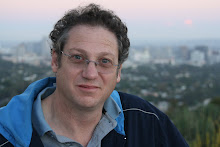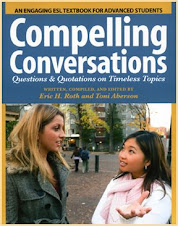What ESL textbooks do you recommend? What are some of your favorite books to help English language learners develop their skills?
Two email requests in 40 hours require a decent response. Here's a quick, concise list of some ESL titles that I've enjoyed. It's by no means comprehensive, and just a starting list heavily influenced by the books in my eyesight.
The Creative Classroom: Teaching Language Outside the Box, by Hall Houston, contains dozens of bite-sized exercises to spark authentic language and creative discourse, This slim book, published by Lynx, should especially appeal to ESL students with a background or interest in engineering, science, and the arts.
Academic ESL/intensive English programs
Cambridge Vocabulary in Use series - An excellent supplemental text, especially for the more academically inclined. The self-contained two page format allows students, teachers, and tutors to pick and choose materials.
Cambridge Grammar in Use series - This series is the only grammar series that I've ever felt comfortable using in the classroom. Again, the accessible, clear format with self-contained lessons allows both self-study and effective use as a supplemental text.
English for Professionals series has become the gold standard for vocational students. The English for Health Sciences and English for Science and Engineering and English for Business all fill vital gaps. The rich collection of concise exercises, emphasizing and re-enforcing each other, make this a logical choice for workforce training programs.
Adult Education:
Side by Side - This classic series, now in its 3rd edition, particularly appeals to English language learners with limited literacy in their own best language. Given the appalling educational policies in some nearby poor countries, this textbook series has become extraordinarily popular in California and Texas.
Day by Day - Simple, clear communicative textbook for workplace instruction. Low intermediate- intermediate.
Oxford Picture Dictionary and workbook - excellent for beginning and intermediate English language learners.
Writing
Writing Academic English, by Alice Oshima and Ann Hogue, provides practical techniques for students planning to attend community college or university. I think the latest version is the fourth. I've used it in several programs with considerable success.
In Focus: Strategies for Academic Writers by Myra Ann Shulman, however, is my current choice for intermediate ESL students.
The clear, detailed exercises allow students to learn academic writing by actually writing short, focused pieces.
Finally, for advanced ESL students and international graduate students, I strongly recommend Academic Writing for Graduate Students, 2d ed.: Essential Tasks and Skills (Michigan Series in English for Academic & Professional Purposes) by John M. Swales and Christine A. Beer Feak. I teach two courses using this textbook at USC, and students make clear, significant progress by completing bite-sized writing exercises and analyzing short journal readings. The teacher's guide, called Commentary for, also deserves to be on your list.
Speaking Skills:
Giving Academic Presentations, by Susan Reinhart, stands heads and shoulders above the other ESL textbooks for public presentations. Students learn how to give clear, systematic oral presentations including problem-solution and process descriptions.
Communicating in Business by Simon Sweeney -Yet another outstanding Cambridge title, this Business English textbook includes helpful materials on negotiating and socializing as well as presenting.
Last, but not least, I naturally recommend Compelling Conversations: Questions and Quotations on Timeless Topics, by Toni Aberson and Eric Roth, as a supplemental text for advanced ESL classes, conversation clubs, and tutors.
Other special interest ESL books of quality.
Film is Content: A Study Guide for the Advanced ESL Classroom by Julia A. Williamson and Jill C. Vincent- This underappreciated University of Michigan textbook deserves a much wider audience. Although slightly dated, students learn critical thinking skills, academic vocabulary, and modern film.
Again, this list is just a starting list. What ESL books have your found effective in your teaching? Why?
Ask more. Know more. Share more.
Create Compelling Conversations.
Visit www.CompellingConversations.com
Subscribe to:
Post Comments (Atom)






No comments:
Post a Comment